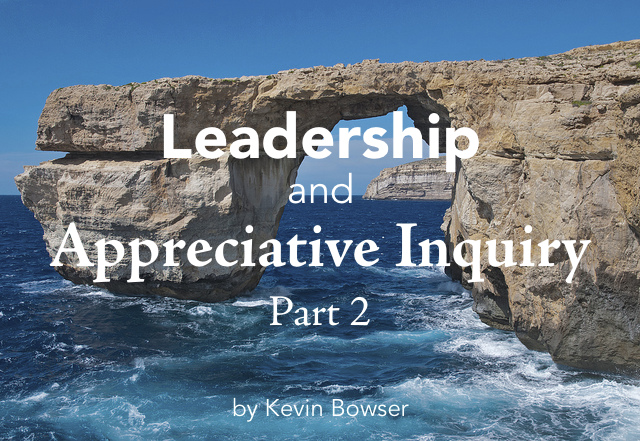Earlier in the week I tried to provide a bit of an overview of what Appreciative Inquiry is all about. The most concise definition I can provide is that it is a way of looking at challenges in a more positive manner.
As a reminder, here are the five principles of AI from my earlier article:
- The Constructionist Principle
- The Simultaneity Principle
- The Poetic Principle
- The Anticipatory Principle
- The Positive Principle
I invite you back to that article for a synopsis of each of those principles. Click this link to review that article.
This article is about the process that comes out of the questioning and positive approach to what many would call “problem solving.”
Appreciative Inquiry attempts to use ways of asking questions and envisioning the future in order to foster positive relationships and build on the present potential of a given person, organization or situation. The most common model utilizes a cycle of four processes, which focus on what it calls:
Discover: The identification of organizational processes that work well. This process assumes that there are in fact processes that are already working well. But, what if there are not? What if the organization is truly dysfunctional?
Dream: The envisioning of processes that would work well in the future. This process assumes that there are no constraints. But, what if my organization is constrained by ever tightening budgets or economic hardships?
Design: Planning and prioritizing processes that would work well. This process assumes that you have the ability to prioritize appropriately. But, many times we find ourselves in situations where we had the wrong priorities.
Destiny (or Deploy): The implementation (execution) of the proposed design. This process assumes that you have the skills to execute. But, many times the folks that have the visionary or softer skills that are embraced by AI do not have the ability to execute a plan that has been designed.
As I look back over what I have written so far, I acknowledge that it seems negative and, therefore, at odds with much of the tenets of AI. However, I live and work in an environment that is constrained. My “day job” is with a major oil & gas company. And believe me, there are constraints in that environment. There are first and foremost, safety constraints. If we cannot do something safely, then we do not even attempt it. There are cost constraints. Despite what you may read in the mainstream media, the old and gas business requires inordinate amounts of capital to execute a project and that capital is constrained by a Board or directors who are responsible to our shareholders.
What is the Leadership Lesson here?
I think the leadership lesson is that as leaders, we need to be a positive influence in our organization. We cannot allow ourselves to be overcome by pessimism and fear of defeat.
If you have cancer, you address the cancer. You don’t just say, “Just imagine how healthy you could be.”
I live in a city where we have one of the finest cancer treatment facilities in the world. This city also is home to one of the largest mega-churches in the world. Both have their purpose. But they are not interchangeable. — Please don’t blow a gasket here. I am not making a theological statement. So, let me be clear, God can heal where hospitals cannot. I am just indicating that both of these institutions are needed. Both have a purpose. Both have an organizational belief system and an operational strategy that is legitimate. And on their best days, neither looks down upon the other for how they approach the world.
I want to emphasize some principles of AI more in my leadership style. The problem (Oh, there I go again. I used the word “problem.”) with AI is that the root causes may not in fact go away merely through asking the right questions and having a positive outlook on life.
Real leaders are willing to look at the situation / problem / challenge / opportunity or whatever you want to call it and see it not only for what it can be. But see it for what it really is today. That reality may be that it is a dysfunctional organization in need of radical surgery in order to save its life.
What are your thoughts on Appreciative Inquiry? Would you be a better leader if you would incorporate some of the principles and process? I am convinced that I will be a better leader for employing some of them. I am just not 100% there. And I don’t think I should be.




Please note: I reserve the right to delete comments that are offensive or off-topic.